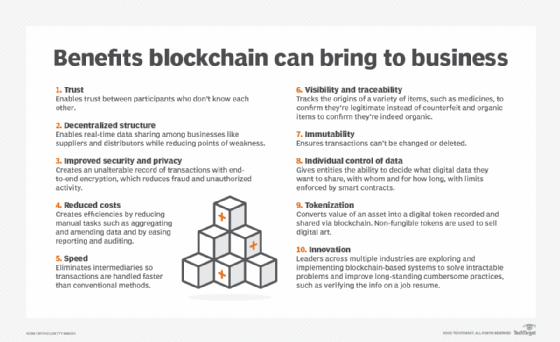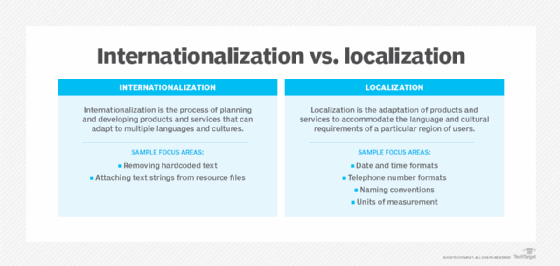Definition of Globalisation in Business Studies
What is globalization?
Globalization is the process by which ideas, knowledge, information, goods and services spread around the world. In business, the term is used in an economic context to describe integrated economies marked by free trade, the free flow of capital among countries and easy access to foreign resources, including labor markets, to maximize returns and benefit for the common good.
Globalization, or globalisation as it is known in some parts of the world, is driven by the convergence of cultural and economic systems. This convergence promotes -- and in some cases necessitates -- increased interaction, integration and interdependence among nations. The more countries and regions of the world become intertwined politically, culturally and economically, the more globalized the world becomes.
How globalization works
In a globalized economy, countries specialize in the products and services they have a competitive advantage in. This generally means what they can produce and provide most efficiently, with the least amount of resources, at a lower cost than competing nations. If all countries are specializing in what they do best, production should be more efficient worldwide, prices should be lower, economic growth widespread and all countries should benefit -- in theory.
Policies that promote free trade, open borders and international cooperation all drive economic globalization. They enable businesses to access lower priced raw materials and parts, take advantage of lower cost labor markets and access larger and growing markets around the world in which to sell their goods and services.
Money, products, materials, information and people flow more swiftly across national boundaries today than ever. Advances in technology have enabled and accelerated this flow and the resulting international interactions and dependencies. These technological advances have been especially pronounced in transportation and telecommunications.
Among the recent technological changes that have played a role in globalization are the following:
Internet and internet communication. The internet has increased the sharing and flow of information and knowledge, access to ideas and exchange of culture among people of different countries. It has contributed to closing the digital divide between more and less advanced countries.
Communication technology. The introduction of 4G and 5G technologies has dramatically increased the speed and responsiveness of mobile and wireless networks.

IoT and AI. These technologies are enabling the tracking of assets in transit and as they move across borders, making cross-border product management more efficient.
Blockchain. This technology is enabling the development of decentralized databases and storage that support the tracking of materials in the supply chain. Blockchain facilitates the secure access to data required in industries such as healthcare and banking. For example, blockchain provides a transparent ledger that centrally records and vets transactions in a way that prevents corruption and breaches.

Transportation. Advances in air and fast rail technology have facilitated the movement of people and products. And changes in shipping logistics technology moves raw materials, parts and finished products around the globe more efficiently.
Manufacturing. Advances such as automation and 3D printing have reduced geographic constraints in the manufacturing industry. 3D printing enables digital designs to be sent anywhere and physically printed, making distributed, smaller-scale production near the point of consumption easier. Automation speeds up processes and supply chains, giving workforces more flexibility and improving output.
Why is globalization important?
Globalization changes the way nations, businesses and people interact. Specifically, it changes the nature of economic activity among nations, expanding trade, opening global supply chains and providing access to natural resources and labor markets.
Changing the way trade and financial exchange and interaction occurs among nations also promotes the cultural exchange of ideas. It removes the barriers set by geographic constraints, political boundaries and political economies.
For example, globalization enables businesses in one nation to access another nation's resources. More open access changes the way products are developed, supply chains are managed and organizations communicate. Businesses find cheaper raw materials and parts, less expensive or more skilled labor and more efficient ways to develop products.
With fewer restrictions on trade, globalization creates opportunities to expand. Increased trade promotes international competition. This, in turn, spurs innovation and, in some cases, the exchange of ideas and knowhow. In addition, people coming from other nations to do business and work bring with them their own cultures, which influence and mix with other cultures.
The many types of exchange that globalization facilitates can have positive and negative effects. For instance, the exchange of people and goods across borders can bring fresh ideas and help business. However, this movement can also heighten the spread of disease and promote ideas that might destabilize political economies.
History of globalization
Although many people consider globalization a twentieth century phenomenon, the process has been happening for millennia. Examples include the following:
- The Roman Empire. Going back to 600 B.C., the Roman Empire spread its economic and governing systems through significant portions of the ancient world for centuries.
- Silk Road trade. These trade routes, which date from 130 B.C. to 1453 A.D., represented another wave of globalization. They brought merchants, goods and travelers from China through Central Asia and the Middle East to Europe.
- Pre-World War I. European countries made significant investments overseas in the decades before World War I. The period from 1870 to 1914 is called the golden age of globalization.
- Post-World War II. The United States led the effort to create a global economic system with a set of broadly accepted international rules. Multinational institutions were established such as the United Nations (UN), International Monetary Fund, World Bank and World Trade Organization to promote international cooperation and free trade.
The term globalization as it's used today came to prominence in the 1980s, reflecting several technological advancements that increased international interactions. IBM's introduction of the personal computer in 1981 and the subsequent evolution of the modern internet are two examples of technology that helped drive international communication, commerce and globalization.
Globalization has ebbed and flowed throughout history, with periods of expansion and retrenchment. The 21st century has witnessed both. Global stock markets plummeted after the Sept. 11, 2001, terrorist attacks in the United States, but rebounded in subsequent years.
More recently, nationalist political movements have slowed immigration, closed borders and increased trade protectionism. The pandemic has had similar effects on borders and immigration and also disrupted supply chains. However, overall, the early 21st century has seen a dramatic increase in the pace of global integration. Rapid advances in technology and telecommunications are responsible for much of this change.
What is the G20?
The G20, or Group of Twenty, is an international forum that aims to foster international cooperation by addressing global economic issues, such as financial stability and climate change. The G20 is made up of 19 countries and the European Union, including most of the world's largest economies.
The nations involved account for 60% of the planet's population, 75% of global trade and 80% of world GDP. It was founded in 1999, following the 1997 financial crisis, and has met every year since then.
Since 2008, the G20 has held an annual summit that brings together heads of state to discuss important economic issues. The G20's president is selected annually on a rotating basis, and that person's home country hosts the summit.
In 2019, the summit was held in Osaka, Japan, and it addressed issues such as women's empowerment, climate change and artificial intelligence. The 2020 summit was to be in Riyadh, Saudi Arabia, but was held virtually because of the pandemic. Three of the main themes addressed were empowering people, especially women and youth; safeguarding the planet; and long-term strategies to share the benefits of innovation and technological advancement. The 2021 summit will be held in Rome, Italy, and will focus on recovery from the pandemic and climate change.
The members of G20 are Argentina, Australia, Brazil, Canada, China, France, Germany, Japan, India, Indonesia, Italy, Mexico, Russia, South Africa, Saudi Arabia, South Korea, Turkey, the United Kingdom, the United States and the European Union. Spain is a permanent guest of the organization.
Types of globalization: Economic, political, cultural
There are three types of globalization.
- Economic globalization. Here, the focus is on the integration of international financial markets and the coordination of financial exchange. Free trade agreements, such the North American Free Trade Agreement and the Trans-Pacific Partnership are examples of economic globalization. Multinational corporations, which operate in two or more countries, play a large role in economic globalization.
- Political globalization. This type covers the national policies that bring countries together politically, economically and culturally. Organizations such as NATO and the UN are part of the political globalization effort.
- Cultural globalization. This aspect of globalization focuses in a large part on the technological and societal factors that are causing cultures to converge. These include increased ease of communication, the pervasiveness of social media and access to faster and better transportation.
These three types influence one another. For example, liberalized national trade policies drive economic globalization. Political policies also affect cultural globalization, enabling people to communicate and move around the globe more freely. Economic globalization also affects cultural globalization through the import of goods and services that expose people to other cultures.
Effects of globalization
The effects of globalization can be felt locally and globally, touching the lives of individuals as well as the broader society in the following ways:
- Individuals. Here, a variety of international influences affect ordinary people. Globalization affects their access to goods, the prices they pay and their ability to travel to or even move to other countries.
- Communities. This level encompasses the impact of globalization on local or regional organizations, businesses and economies. It affects who lives in communities, where they work, who they work for, their ability to move out of their community and into one in another country, among other things. Globalization also changes the way local cultures develop within communities.
- Institutions. Multinational corporations, national governments and other organizations such as colleges and universities are all affected by their country's approach to and acceptance of globalization. Globalization affects the ability of companies to grow and expand, a university's ability to diversify and grow its student body and a government's ability to pursue specific economic policies.
While the effects of globalization can be observed, analyzing the net impact is more complex. Proponents often see specific results as positive and critics of globalization view the same results as negative. A relationship that benefits one entity may damage another, and whether globalization benefits the world at large remains a point of contention.

Examples of globalization
Multinational corporations are a tangible example of globalization. Some examples include the following:
- McDonald's had 39,198 fast-food restaurants in 119 countries and territories, according to its Securities and Exchange Commission filing at the end of 2020. It employed more than 2.2 million people at that time, the filing said.
- Ford Motor Company reported in 2021 that it works with about 1,200 tier 1 suppliers around the globe.
- Amazon's recent expansion has it using tens of thousands of suppliers and employing more than nearly 1.3 million full- and part-time employees.
Through their influence on social and economic development in the countries that host them, multinational corporations embody the contradictions of globalization. They bring jobs, skills and wealth to the region they are investing or doing business in. But they also can destroy local businesses, exploit cheap labor and threaten indigenous cultures. The benefits they offer are often unsustainable because the loyalty of multinationals is to their investors and bottom lines and not to the local people, economies and cultures where they are doing business.
Another example of globalization is the response to the COVID-19 pandemic. Because the world was able to communicate across boundaries, nations were able to work together to quickly produce vaccines for the virus. In addition, doctors traveled where they were needed. For example, Cuba sent doctors to Italy at the beginning of the pandemic to assist with the crisis as it developed there.
However, countries also enacted strict travel restrictions and many closed their borders to cut down on the free movement of people and spread of the virus.
Benefits of globalization
Globalization enables countries to access less expensive natural resources and lower cost labor. As a result, they can produce lower cost goods that can be sold globally. Proponents of globalization argue that it improves the state of the world in many ways, such as the following:
- Solves economic problems. Globalization moves jobs and capital to places that need these resources. It gives rich countries access to lower cost resources and labor and poorer countries access to jobs and the investment funds they need for development.
- Promotes free trade. Globalization puts pressure on nations to reduce tariffs, subsidies and other barriers to free trade. This consequently promotes economic growth, creates jobs, makes companies more competitive and lowers prices for consumers.
- Spurs economic development. Theoretically, globalization gives poorer countries access to foreign capital and technology they would not otherwise have. Foreign investment can result in an improved standard of living for the citizens of those nations.
- Encourages positive trends in human rights and the environment. Advocates of globalization point to improved attention to human rights on a global scale and a shared understanding of the impact of people and production on the environment.
- Promotes shared cultural understanding. Advocates view the increased ability to travel and experience new cultures as a positive part of globalization that can contribute to international cooperation and peace.
Negative consequences of globalization
Many proponents view globalization as way to solve systemic economic problems. But critics see it as increasing global inequality. Among the critiques of globalization are the following issues:
- Destabilizes markets. Critics of globalization blame the elimination of trade barriers and the freer movement of people for undermining national policies and local cultures. Labor markets in particular are affected when people move across borders in search of higher paying jobs or companies outsource work and jobs to lower cost labor markets.
- Damages the environment. The transport of goods and people among nations generates greenhouse gas and all the negative effects it has on the environment. Global travel and trade also can introduce, sometimes inadvertently, invasive species to foreign ecosystems. Industries such as fishing and logging tend to go where business is most lucrative or regulations are less strict, which has resulted in overfishing and deforestation in some parts of the world.
- Lowers living standards. When companies move operations overseas to minimize costs, such moves can eliminate jobs and increase unemployment in sectors of the home country.
- Facilitates global recessions. Tightly integrated global markets carry a greater risk of global recessions. The 2007-2009 financial crisis and Great Recession is a good example of how intertwined global markets are and how financial problems in one country or region can quickly affect other parts of the world. Globalization reduces the ability of individual nations to effectively use monetary and fiscal policy to control the national economy.
- Damages cultural identities. Critics of globalization decry the decimation of unique cultural identities and languages that comes with the international movement of businesses and people. At the same time, the internet and social media are driving this trend even without the movement of people and commerce.
- Increases the likelihood of pandemics. Increased travel, critics say, has the potential to increase the risk of pandemics. The H1N1 (swine flu) outbreak of 2009 and coronavirus in 2020 and 2021 are two examples of serious diseases that spread to multiple nations quickly.
Future of globalization
Technological advances, particularly blockchain, mobile communication and banking, are fueling economic globalization.
Nonetheless, rising levels of protectionism and anti-globalization sentiment in several countries could slow or even reverse the rapid pace of globalization. Nationalism and increasing trends toward conservative economic policies are driving these anti-globalization efforts.
Global trade is also made more difficult and facing rising threats from other factors, such as these:
- climate change
- decaying infrastructure
- cyber attacks
- human rights abuses
The takeaway
Globalization is a longstanding trend that is in the process of changing and possibly slowing. There are advantages to the more open border and free trade that globalization promotes, as well as negative consequences.
In a modern, post-pandemic world, individuals, businesses and countries must consider both sides of the globalization issue. Learn how companies are rethinking global supply chains to avoid disruption and reap the benefits of globalization.
Definition of Globalisation in Business Studies
Source: https://searchcio.techtarget.com/definition/globalization
0 Response to "Definition of Globalisation in Business Studies"
Post a Comment